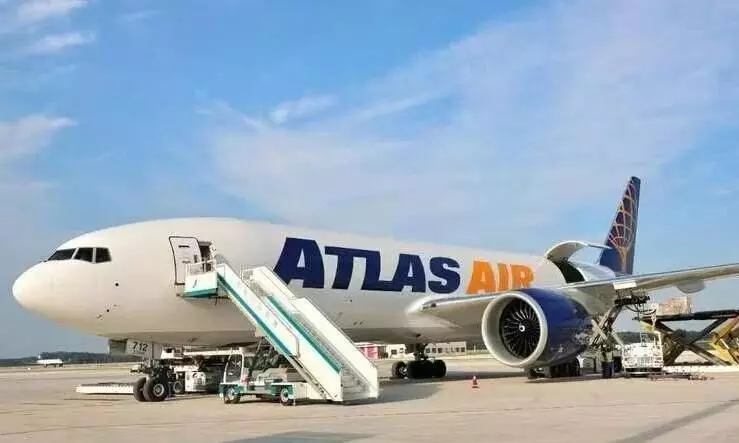
Atlas Air launches Europe freighter service from Jinan
The service, operated by Atlas Air, runs twice a week with a maximum capacity of 100 metric tonnes.

Image: sdjtys (WeChat)
A Boeing 777 freighter landed at Jinan Yaoqiang International Airport in Jinan, the capital of East China’s Shandong province. on September 6, marking the launch of the Luxembourg–Jinan–Nottingham cargo route. This becomes the airport’s third international service with fifth freedom rights, further boosting Jinan’s air logistics connectivity with Europe.
The service, operated by Atlas Air, runs twice a week with a maximum capacity of 100 metric tonnes. Imports from Luxembourg consist mainly of salmon and auto parts, while exports to Nottingham are dominated by e-commerce parcels.
The airport has also launched dedicated freighter services to Tokyo and Bangkok since August, strengthening its international connectivity.
The new service reinforces Jinan Airport’s position as a key hub linking China and Eurasia, offering flexible, efficient, and diversified supply chain solutions for cross-border trade enterprises in Shandong and East China.
Between September 2024 and August 2025, Jinan Airport recorded strong outbound cargo flows, led by ASL Airlines operating freighters with 18,000 tonnes, though volumes dipped 5 percent year-on-year. Qatar Airways, also operating freighters, handled 3,000 tonnes, marking a sharp 270 percent increase. Tianjin Airlines contributed 2,000 tonnes on freighter services. On the passenger side, China Eastern carried 1,000 tonnes in bellyhold capacity, down 5 percent from the previous year, while smaller contributions came from China Southern (89 tonnes) and Air China (35 tonnes), according to data from Rotate.
Image: Rotate
From September 2024 to August 2025, Almaty (ALA) emerged as the leading outbound destination from Jinan Airport, with 11,000 tonnes of cargo, up 89 percent year-on-year. Anchorage (ANC) followed with 7,000 tonnes, showing steady growth of 8 percent. Doha (DOH) recorded 3,000 tonnes, a sharp 270 percent increase, while Seoul Incheon (ICN) handled 2,000 tonnes, surging more than 19,000 percent due to new operations. Sydney (SYD) contributed 1,000 tonnes of bellyhold cargo, down 5 percent, and Tokyo Narita (NRT) volumes fell 19 percent to 89 tonnes.
Looking ahead, the airport aims to expand cargo services across East Asia, Southeast Asia, and Europe, developing a global network that connects major freight hubs, boosts aggregation and distribution capacity, and supports the worldwide reach of Chinese products.

